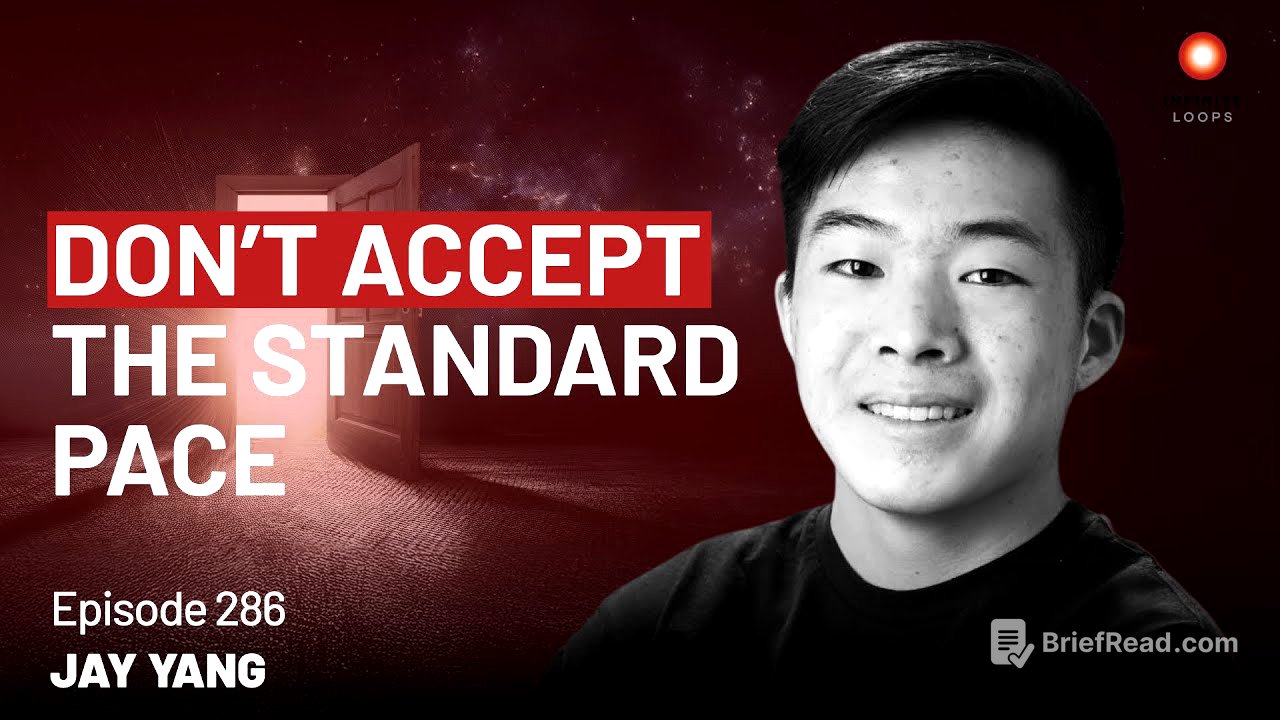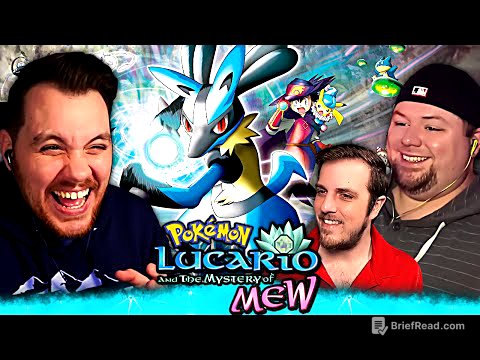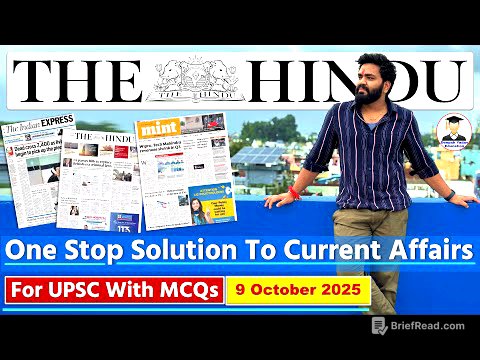TLDR;
This video features a conversation with Jay Yang, author of "You Can Just Do Things," discussing the philosophy of permissionless action, overcoming limiting beliefs, and the importance of clarity over motivation. They also touch on the impact of AI, the trap of busyness, and strategies for identifying valuable signals amidst the noise. Key takeaways include embracing failure as feedback, the power of persistence, and the significance of curiosity and cognitive diversity.
- Permissionless action involves proactively creating opportunities by doing the work upfront.
- Overcoming limiting beliefs requires reprogramming your mental software and starting with small, confidence-building actions.
- Clarity is more important than motivation; identifying your "North Star" and anti-goals helps guide decisions and actions.
- AI should be embraced as a tool to enhance productivity and learning, not feared or rejected.
- Focus on outputs rather than inputs, and prioritize learning from those who have a proven track record of helping others succeed.
Intro [0:00]
The intro emphasizes that failure is not the opposite of success but a necessary part of it. It highlights the importance of having a strong reason for working hard, turning hard work into a fulfilling pursuit rather than a burden. The key is to challenge conventional timelines and accelerate progress by questioning what's truly holding you back.
Guest Introduction [0:44]
Jimbo introduces Jay Yang, highlighting his high agency and proactive approach to creating opportunities. Jay's early initiatives, such as cold emailing Tyler Denk with a concrete plan and providing Noah Kagan with a detailed audit, demonstrate his commitment to doing the work upfront. The discussion will focus on Jay's book, "You Can Just Do Things," which promotes taking small, bold actions to achieve compounding results.
The Philosophy of Permissionless Action [1:35]
Jay elaborates on the philosophy of permissionless action, emphasizing that opportunities often need to be created rather than handed out. He advises listeners to challenge the standard pace of life and career progression, questioning whether conventional paths are truly right for them. Permissionless action involves doing the work upfront to demonstrate both the desire and capability to seize an opportunity, making it a "no-brainer" for the other person.
Breaking Free from Era-Defining Ideas [5:46]
The conversation shifts to how individuals are influenced by the prevailing ideas of their time and the effort required to break free from them. Jay and Jimbo discuss the importance of recognizing that traditional paths may not suit everyone and the need to challenge societal norms. Jimbo shares his experience of starting an asset management company without backers, defying conventional expectations.
Overcoming Limiting Beliefs [12:17]
Jay addresses the issue of limiting beliefs, recounting an email from a reader who felt his advice was not applicable to her circumstances. He emphasizes that while everyone starts with different circumstances, taking responsibility for one's life is crucial. Jay encourages listeners to question the "mental software" running through their minds and to challenge negative thought patterns.
Inner vs. Outer Orientation [15:54]
Jimbo introduces the concept of inner versus outer orientation, noting that those with an outer orientation tend to blame external factors for their failures. He shares his personal philosophy of taking responsibility for everything, both successes and failures, as a way to internalize control. Jay and Jimbo explore ways to upgrade one's internal operating system to soften the urge to blame others.
Inputs vs. Outputs: The Agency Divide [17:39]
Jay introduces the concept of focusing on outputs versus inputs. Low-agency people tend to focus on the effort they put in, while high-agency people focus on the actual results achieved. He emphasizes the importance of taking responsibility for outcomes and asking questions like, "How do I increase the likelihood of success?" and "How do I decrease the risk of failure?"
Failure as Feedback [20:16]
The discussion addresses how to deal with failure, emphasizing that it should be viewed as feedback rather than the opposite of success. Jay argues that the only true failure is quitting after experiencing setbacks. Jimbo shares his friend's concept of "prefall" versus "postfall" individuals, highlighting the humility and lessons learned from experiencing failure.
The Power of Persistence [25:44]
The conversation shifts to the power of persistence, with Jimbo quoting Calvin Coolidge on the importance of persistence over talent, genius, and education. Jay connects persistence to obsession, arguing that those who are obsessed with what they do are naturally driven to persist. He shares his personal experience of writing his book because he "couldn't not write about it."
Curiosity and Cognitive Diversity [30:38]
Jay and Jimbo discuss the role of curiosity in high agency individuals, noting that they are naturally more curious about the world around them. Jimbo shares an anecdote about how cognitive diversity among his team members leads to innovative solutions. Jay emphasizes the value of being in a room with people from diverse backgrounds and perspectives.
AI and the Future of Work [35:10]
The conversation turns to the impact of AI, with Jimbo declaring OSB an "AI-first company." They discuss the resistance to AI and the importance of embracing it as a tool to enhance productivity and learning. Jay argues that humans with tools will always outperform humans without tools, and young people who don't use AI will quickly fall behind.
The Busy-ness Trap [44:30]
Jimbo and Jay critique the glorification of busyness, arguing that working harder does not necessarily equate to being morally superior or achieving better results. Jay shares an analogy about chopping down trees, emphasizing that leverage is more important than effort. They discuss the "time punch card fallacy" and the need to focus on outputs rather than hours worked.
Signal vs. Noise in the AI Era [51:25]
The discussion addresses how to identify valuable signals amidst the increasing noise in the AI era. Jay advises listeners to seek out mentors who have a proven track record of helping others succeed, rather than those who are simply charismatic. He suggests that the people you can learn the most from often aren't super huge on social media.
People You Learn From Don't Have Huge Following [56:44]
Jay emphasizes that the most valuable mentors are often not those with large social media followings, but rather operators who have quietly compounded their experience in the trenches. He draws a distinction between those who are trying to be charismatic for attention and those who are genuinely sharing their experiences to help others.
The TAG Method Explained [59:32]
Jay explains the TAG method for creating opportunities: Target, Audit, Gift. First, pick a target who is one to two steps ahead of you. Second, audit their work and identify their goals and problems. Third, gift them something of value for free, demonstrating your skills and desire to help.
The New Way of Hiring [1:02:26]
Jimbo shares how OSB has changed its hiring process, starting everyone as a consultant to get a better sense of their abilities over time. He recounts how his newest chief of staff got the job by sending a compelling video, showcasing the power of a "gift." Jimbo and Jay discuss why more people don't leverage these methods to find and create opportunities.
Learning from the Greats [1:07:26]
The conversation touches on the importance of learning from the experiences of others, with Jimbo referencing Douglas Adams' observation that humans are often disinclined to do so. Jay emphasizes the opportunity cost of not learning from those who have come before you, noting that million-dollar lessons are often hidden in $30 books.
Motivation vs. Clarity [1:09:06]
Jay reiterates that people often lack clarity rather than motivation. He explains that procrastination and inefficiency often stem from not knowing why you're doing something or why it matters. Identifying your "North Star" makes everything else clearer and guides your decisions.
Jay’s North Star and Anti-Goals [1:10:11]
Jay shares his personal "North Star," a play on Naval Ravikant's quote: a fit body, a calm mind, a house full of love, meaningful work, and enough wealth to not have to worry about it. He also outlines his anti-goals, such as being fat, stressed, and isolated, working on meaningless tasks, and regretting not experiencing the vastness of life.
Viktor Frankl and Finding Your Why [1:13:46]
Jimbo references Viktor Frankl's quote, "You can deal with almost any what if you know why," emphasizing the importance of finding your purpose. He cautions against sacrificing long-term goals for short-term gains, noting that path dependency can make it difficult to change course later in life.
Working in Public [1:17:35]
Jay discusses the unexpected benefits of working in public, including the opportunity he currently has at acquisition.com. He emphasizes the serendipitous connections and conversations that have resulted from sharing his work online.
The Second Book Preview [1:20:10]
Jay previews his second book, which focuses on how to stand out within an opportunity once you've obtained it. He shares a hint from the book: "Descend into hell to create heaven."
The Emperor Question [1:23:37]
As is tradition on the podcast, Jay is asked what two things he would decree if he were emperor of the world for a day. He answers: "You can just do things" and "Define your North Star."
Closing & Contact Information [1:24:47]
Jimbo thanks Jay for his insights and encourages listeners to find him online at Jayang Inspires on social media and janginspires.behive.com for his newsletter. He expresses his hope that Jay's book will inspire more people to take action and embrace high agency.









